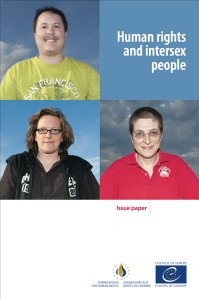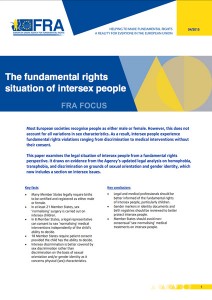Council of Europe on “Human rights and intersex people”
Binary classifications of sex and gender are omnipresent in our society and inform the way we understand and organise the world around us. The classification of humankind into two categories – “F” (female) and “M” (male) – and the entrenchment of those categories in identification documents, expose people who do not fit neatly into those two categories to human rights breaches. Among them, intersex persons are especially vulnerable.
Stereotypes hinging on the supposed dichotomy of gender as well as the medical norms of so-called female and male bodies have allowed for the establishment of routine medical and surgical interventions on intersex people, even when such interventions are cosmetic rather than medically necessary, or when those concerned have not been adequately consulted or informed prior to these procedures. Secrecy and shame around intersex bodies have permitted the perpetuation of these practices for decades, while the human rights issues at stake have remained for the most part unaddressed.
The document makes welcome reference to the Australian Senate report, “Involuntary or coerced sterilisation of intersex people in Australia”, even while that report has not yet been implemented by any Australian government. The following statement by the Senate committee is quoted:
There is frequent reference to “psychosocial” reasons to conduct normalising surgery. To the extent that this refers to facilitating parental acceptance and bonding, the child’s avoidance of harassment or teasing, and the child’s body self-image, there is great danger of this being a circular argument that avoids the central issues. […] Irreversible medical treatment, particularly surgery, should only be performed on people who are unable to give consent if there is a health-related need to undertake that surgery, and that need cannot be as effectively met later, when that person can consent to surgery.
The Council of Europe affirm the same principles, and add:
Intersex persons’ right not to undergo sex assignment treatment must be respected.
The Council of Europe document benefitted from broad European and global consultation, with the contributions of intersex activists, and legal and medical experts. It included medical experts such as Mika Venhola, who support a human rights-based approach to intersex issues. Morgan Carpenter, president of OII Australia, was delighted to participate in a consultation leading to this report, in Malta in 2013. He comments:
This is a landmark report that identifies several crucial areas of reform to improve the health and human rights of people with intersex variations. It calls for an end to non-necessary “normalizing” medical interventions and the pathologisation of intersex people; in their place, intersex people and our families need access to peer and family support. The report calls for the inclusion of intersex people in anti-discrimination legislation, access to justice and our involvement in research and reform measures. It also calls for flexibility and autonomy in self-identifying sex and gender.
While Australia has made numerous advances, we still remain subject to non-necessary and harmful medical interventions, without reparation. We lack visibility and clear understanding of intersex issues – and the resources to tackle these issues. We still also lack autonomy over how our sex and gender is designated in official documents; recent developments have often made harmful and inappropriate assumptions that intersex people, with an extraordinarily diverse range of atypical sex characteristics, are an homogeneous third sex.
Australian governments must also step up and act.
We warmly congratulate the Council of Europe on publishing this report. It is a pleasure to see included a set of photographs by Del LaGrace Volcano.
Read the OII Europe press release
All 8 recommendations are published below.
Focus report by EU Agency for Fundamental Rights
Simultaneously, the European Union Agency for Fundamental Rights published a Focus Paper on intersex people. It comments that:
Intersex people will remain vulnerable to discrimination … as long as they are medically diagnosed as men or women with a health disorder.
More information
- Read the Council of Europe issue paper
- Read the Council of Europe statement about this report
- Read a summary infographic
- Read the report of the European Union Agency for Fundamental Rights
- Read the OII Europe press release
Council of Europe report recommendations
- Member states should end medically unnecessary “normalising” treatment of intersex persons, including irreversible genital surgery and sterilisation, when it is enforced or administered without the free and fully informed consent of the person concerned. Sex assignment treatment should be available to intersex individuals at an age when they can express their free and fully informed consent. Intersex persons’ right not to undergo sex assignment treatment must be respected.
- Intersex persons and their families should be offered interdisciplinary counselling and support, including peer support. Intersex persons’ access to medical records should be ensured.
- National and international medical classifications which pathologise variations in sex characteristics should be reviewed with a view to eliminating obstacles to the effective enjoyment, by intersex persons, of human rights, including the right to the highest attainable standard of health.
- Member states should facilitate the recognition of intersex individuals before the law through the expeditious provision of birth certificates, civil registration documents, identity papers, passports and other official personal documentation while respecting intersex persons’ right to self-determination. Flexible procedures should be observed in assigning and reassigning sex/gender in official documents while also providing for the possibility of not choosing a specified male or female gender marker. Member states should consider the proportionality of requiring gender markers in official documents.
- National equal treatment and hate crime legislation should be reviewed to ensure that it protects intersex people. Sex characteristics should be included as a specific ground in equal treatment and hate crime legislation or, at least, the ground of sex/gender should be authoritatively interpreted to include sex characteristics as prohibited grounds of discrimination.
- National human rights structures such as ombudspersons, equality bodies, human rights commissions and children’s ombudspersons should be active in their outreach towards intersex people, including children. They should be clearly mandated to work on issues related to intersex people and to provide victim-support services to them. There is a need to facilitate intersex persons’ access to justice.
- Member states should carry out research into the situation and human rights protection needs of intersex people in different settings. There is an urgent need to improve public awareness and professional training about the problems encountered by intersex persons. Intersex people and organisations representing them should be enabled to participate actively in research concerning them and in the development of measures improving their enjoyment of human rights.
- The human rights violations intersex people have suffered in the past should be investigated, publicly acknowledged and remedied. Ethical and professional standards, legal safeguards and judicial control should be reinforced to ensure future human rights compliance.


You must be logged in to post a comment.